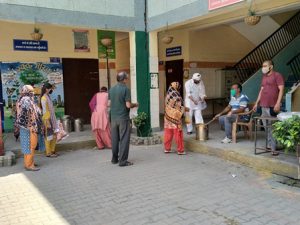Coronavirus Poses Multiple Challenges for the Nation
Emergency measures have begun monitoring the anticipated economic crisis. The struggle to prevent to keep India’s economy afloat is real.

The Indian Economy is facing an unprecedented crisis. The GDP growth rate was already descending from 8.2 per cent in 2016–17 to 6.8 per cent in 2018–19. Since 2019–20, the growth rate is deteriorating almost every quarter from 7.1 per cent to 4.7 per cent in Q3 of 2019–20. Moody has slashed its estimate for India’s GDP growth during the 2020 calendar year to 2.5 per cent. The country has not seen such a financial crisis even when it was facing the worst economic crisis in 1991. At that time, our forex reserve was not even one billion dollars, which was equivalent to the import cover for our minimum requirement of petrol and other related products for one week. Similarly, in 2008, we faced a financial crisis. However, we did not venture to proclaim Financial Emergency.During the financial crises in 1991 or 2008, the government had taken a number of measures, which are normally taken only during a financial emergency. For example, the government has ordered impounding of arrears of Dearness Allowance or putting the Dearness Allowance arrears in Provident Fund, freezing of Leave Travel Concession (LTC), or freezing of Medical Reimbursement facilities and Compulsory deposit scheme. Even without declaring a financial emergency, we have taken these measures in times of economic crisis. This is because, if we declare ourselves a bankrupt, no country or international organization will give us any loan, since our repaying capacity would be in doubt and may create a panicky situation in the country.
The emergency provisions are needed primarily to help Union Executive with powers so that they deal with an emergency situation in a coordinated way, without really spending time by reaching out to state governments or even the Parliament for immediate approval. Article 360 states that if the president is satisfied that a situation has arisen in which the financial stability or credit of India or any part of the territory thereof is threatened, he can make a declaration. The satisfaction of the president is the satisfaction of the Union Council of Ministers, under Article 74.
Also Read : Containing The Deadly Covid 19 Viability Of Pooling Technologies
To face the COVID Pandemic, the Government of India has taken a number of decisions, which are unprecedented.
The government announced 40 days nationwide lockdown. The Ministry of Home Affairs issued an order on 24 March 2020 using Section 6of the Disaster Management Act, 2005, directing the Ministries andDepartments of the Government of India, state and union territory governments and authorities to implement the lockdown. Can the Government of India Order be applicable to all state governments, without emergency provisions? The Disaster Management Act, 2005 defines ‘disaster’ broad enough to include COVID-like situation. Whether the Order directing state governments not be the violation of cooperative federalism? The Entry 29 of the concurrent list reads: “Prevention of the extension from one State to another of infectious or contagious diseases or pests affecting men, animals or plants.”The subject being in the concurrent list, the Central law (the Disaster Management Act, 2005) prevails over any laws made by state legislatures under Article 254.Circumventing the values of federalism without resorting to emergency provisions is anyway child’s play for this government.If the Prime Minister had the intent to consult state governments, he would not have held the first all CM meeting, 13 days after his speech to the people when he asked everyone to observe Janta Curfew.
The Union Government creates a dedicated PM CARES, a relief fund. The Ministry of Corporate Affairs allowed contributions to the PM CARES fund as corporate social responsibility (CSR) expenditure, under the Company Act. It also clarifies that contributions to ‘Chief Minister’s Relief Fund’ and ‘State Relief Fund’ for COVID-19 cannot be claimed as CSR spending by companies. The point is that there is a proactive way to maximize Union finances at the cost of even donations to the state governments. It is not a procedural, but an intent issue.
Similarly, the Union Cabinet reduced the salaries of MPs by 30 per cent for a year. The salary, allowances and pension of Members of Parliament Act, 1954 was amended through an Ordinance. As an ordinance is a legislative power within the Union Government, there is no need for a declaration of any financial emergency. Generally, the Ordinance is avoided, by convention, for money bills. The day is not far when the budget itself could be passed through an ordinance. The Executive clearly does not really care about any discussion in legislature, let alone their concurrence.

Similarly, the government appealed to all government employees to contribute their one day’s salary every month till March 2021 to the PM CARES (Prime Minister’s Citizen Assistance & Relief in Emergency Situations) Fund to aid the government’s efforts to fight the coronavirus pandemic.The Department of Revenue, Government of India, has worded its circular carefully to be an appeal with an opt-out clause. Now, various state governments are issuing similar circulars. Again, this provision did not even require an executive order. An appeal circular was enough to reduce 3 per cent of every official’s salary.
Various state governments have enforced curtailment of free movement of people during the lockdown, just using orders under Section 144 of the Code of Criminal Procedure. Many fundamental rights have been curtailed, including even the right to life, dignity and livelihood of millions of migrant workers without any legal framework. It is true that everyone understands the significance of the Pandemic slowdown, but everyone expects a due process of law. And it is not that there are no provisions, it is about the lack of intent.
Also Read : How Would India Become A 5 Trillion Economy
Interestingly, there is a Public Interest Litigation (PIL) pending in the Supreme Court, which is seeking the intervention of the Court to direct the Central Government to declare a financial emergency, calling many of these actions arbitrary and without following the procedures stated in the Constitution of India. The days of judicial activism, when post cards used to activate justice, are being cherished now. The cases pertaining to fundamental rights and principles of federalism and secularism seem to have been relegated resulting in the miscarriage of justice.
Forget about judicial activism, there is an absence of valuing the principle of collective responsibility. The state of Madhya Pradesh has a one-man council of ministers for 28 days now. The state did not feel the need for a dedicated health minister even at the time of the pandemic. The Karnataka Chief Minister was the sole minister for 25 days. The situation today is that head of the governments do not encourage any advice. The political executive represents the will of the electorate; a council of ministers constitute members who constantly think about their need to go back to the people during elections, and hence their views would decisively reflect the pulse of the people than the bureaucrats who manage the administration.
The Constitution of India had expected every institution like Parliament, Judiciary, CAG, CEC and including each minister and the corresponding standing committees to be independent in their own sphere. However, it is not happening. Probably, we are the only country, which has a doctor as health minister, but he rarely faces the press? At this time when people are worried about the impact of the pandemic, is it not desirable that the Chief Political Executive explains the present situation and follow-up measure in an open press conference—just like in every other country? The fear of coronavirus is temporary. The virus that has affected the governance is unfortunately fatal for Indian democracy.
(Slider Photo credit: Praveen Raj, New Delhi)
